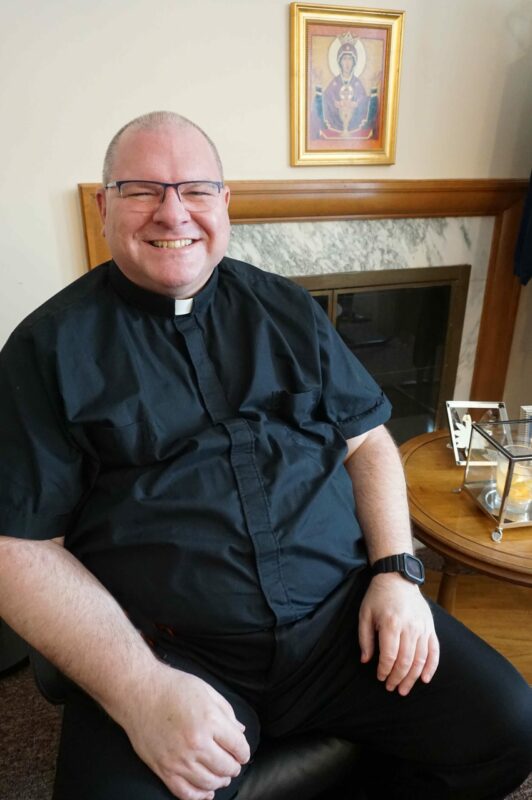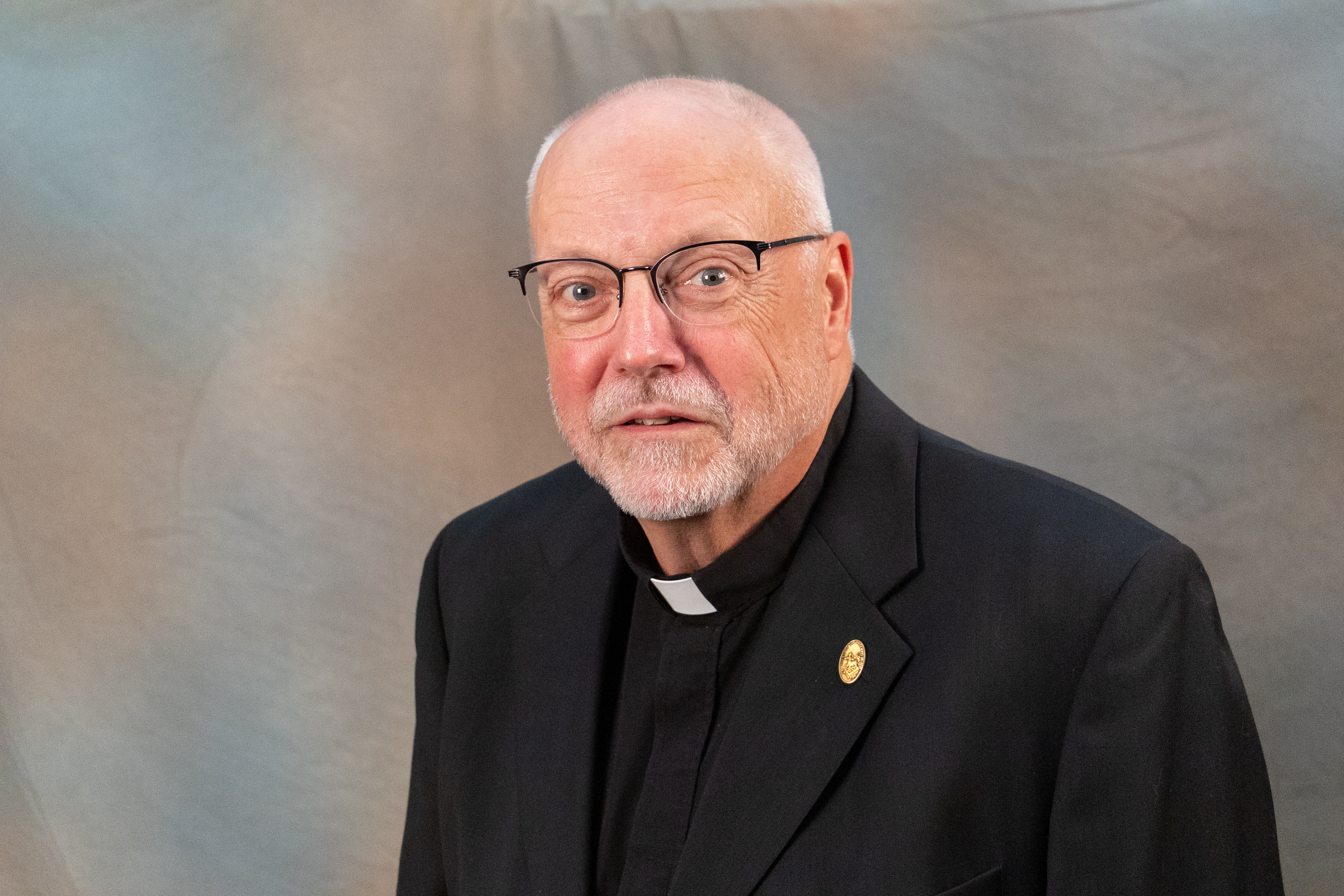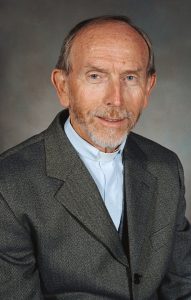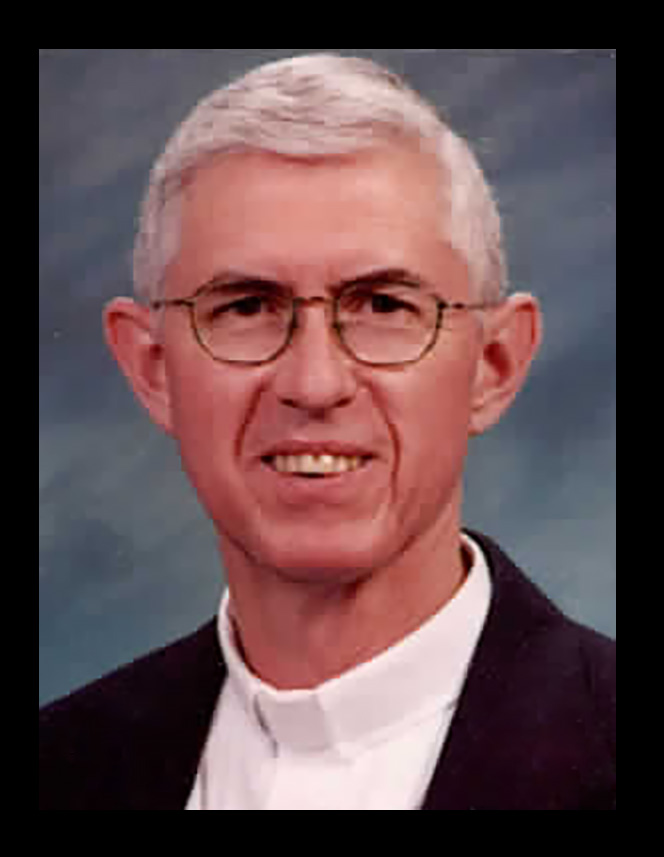Nov 18, 2023
By Fr. Tim Knepper, C.PP.S.
A while back, I went to my local barber for a haircut. He knew I was a Catholic priest, and so religious and theological topics came up all the time. He attended a non-denominational Protestant church, and so this was my small part in ecumenical dialogue.
One day, the subject that came up during the haircut was forgiveness. In the midst of the conversation, we arrived at a disagreement on my choice of shampoo, but more importantly, we disagreed on reconciliation. The way he described reconciliation still sticks with me. He said that God does reconcile the sinner, but we as Christians “bury our wounded.”
There is a type of burying in the Gospel this weekend. One of the workers in the parable, the third one who receives only one talent, buries the talent the master gives him. From the perspective of the master who beats him and takes the buried talent away from him, he was supposed to have made money off of the talent according to the master upon his return home.
There is something in the affirmation from the master to the first two servants, “Well done, my good and faithful servant,” that shapes our reading of the third servant as bad for having buried the talent he received. Why did he bury it? One possibility is that he wanted to avoid taking a risk, as the first two servants did.
It is not just money or the dead that get buried in our Christian lives. My barber was right, both about the shampoo and “burying our wounded.” It’s sometimes easier to bury more than just money or the dead to give off a sanitized version of our lives and our faith. It’s easier to try to show a life or faith devoid of any messiness or wounded-ness that is a part of real life. The stories of the saints sometimes have buried facts about them, because the authors thought that if people knew those “buried” facts about their lives, we might not call them saints anymore. God’s grace turns sinners into saints, no matter what we try to bury or keep buried.
Precious Blood spirituality leans into our wounded-ness and our wounds. “Burying our wounded” isn’t in line with who God calls us to be or how God calls us to treat one another or ourselves. To echo today’s reading from Proverbs, the wounds of Christ are precious, beyond the worth of pearls, and the importance of Christ’s wounds brings importance to our wounds too.
Our wounds are important enough to not be buried. Our wounded are important enough to not be buried. Through our wounds, we come closer to Christ, and we are strengthened by our God. Today, God calls us to remember the value of our wounds and our wounded and to unbury anything and anyone we would bury.
To view the full scripture reading, click here.


Fr. Tim Knepper, C.PP.S., is the parochial vicar of St. Joseph Catholic Church, Palm Bay, Fla. He is also a spiritual director.
Nov 4, 2023
By Fr. Bill Nordenbrock, C.PP.S.
Praying with the scriptures today has missionary images dancing and intermingling in my heart and mind.
The first image St Paul gives us: A missionary is a mother who gives life to another and nurtures that life. The mother nursing her child at her breast, the child’s eyes locked on the face of the mother. The nurturing of child with milk, and more so, with a totally selfless love for the child. A missionary/mother giving of herself with an undeniable and never-failing love. Such sweet tenderness!
The dance partner is one of my favorite Precious Blood images, the Unity or Schoenstatt crucifix. Again, this is image of a mother and child and the self-giving of a life through divine love, but here it is the child who allows his life to be poured out for another in a sacrifice of love. The ever-faithful mother at his side, at one with him in the sacrifice, receiving the Precious Blood in a chalice so that it can be shared. It is offered to me and you, so that we are brought into that same communion of salvific love. Such sweet communion!
As these images dance and intermingle they question my missionary heart and mind.
- How does the love of a mother-God nurture my life and form me to be missionary in all that is to come?
- How in my missionary life am I to be like St Paul, a self-less loving mother who tenderly creates and nurtures the life of others?
- How am I to love in a profound and sacrificial way, like the child on the cross?
- And how am I to be the vessel, the participant who shares in the sacrifice and whose life is an offering of communion?
It is the interplay of those two mother and child images that expresses the challenging Gospel message. Jesus speaks of priests and church leaders. The command to us is to ensure that our missionary preaching is authenticated by our way of life. No cheap talk is permitted. He urges us to embrace a place of humble service and avoid places and positions of privilege and honor. It is as if he says to us:
- Be like me―Drink deeply of the love of God because it will strengthen you and give you life.
- Be like my mother―give lovingly of yourself to nurture the life of the helpless and those in need.
- Be like me―willing to pour out your life as a sacrifice for the life of others.
- And be like my mother―the vessel who carries my Precious Blood into the world.

 A former moderator general of the worldwide congregation, Fr. Bill Nordenbrock, C.PP.S., resides in Chicago. He serves as the provincial secretary and treasurer of the United States Province.
A former moderator general of the worldwide congregation, Fr. Bill Nordenbrock, C.PP.S., resides in Chicago. He serves as the provincial secretary and treasurer of the United States Province.
Oct 28, 2023
Christ speaks to us of the greatest commandment: “You shall love the Lord your God with all your heart, with all your soul and with all your mind.” What motivates us to do that?
We are in the time of year when seasons change and we witness the dynamic of creation.
Science tells us that planet Earth has been the process of creation for millions of years.
The last glacier covered most of Ohio between 35,000 and 12,000 years ago.
What was this creative process through which God put planet Earth to prepare a place for us where we can enjoy a fall and winter of 2023, and then another spring and summer of 2024? I remember so well as a kid looking up at the night sky over in the Best State of these United States (which is Indiana, in case you didn´t know) when there were no outside lights. I would see a sky just full of stars from east to west, from north to south, making me think of how great God is, making all this possible.
Now some 80 years later, I look up into that same sky, somewhat impaired by the streetlights and security lights of the city, but still I see a few stars, the crescent moon, half and then full and the sun in all its splendor lighting our planet every 24 hours. How can one not love a heavenly Father who has prepared planet Earth for us to enjoy?
That us is not just for us residents of beautiful Ohio, but for all humanity with whom we share planet Earth. Thus says the Lord: “You shall not molest or oppress an alien, for you were once aliens.” We hear this in our first reading from Exodus 22. We are to make immigrants welcome so they too can enjoy in 2023–24.
Changing life and God: We are pilgrims and, on our way “to serve the living and true God and await his Son from heaven, whom he raised from the dead, Jesus, who delivers us from the coming wrath,” as we hear in our second reading from 1 Thessalonians 1. Again, what a loving Father God we have, who as sent his Son, Jesus to prepare the pilgrim way through this life and into new life.


Fr. James Gaynor, C.PP.S., who served in Peru for many years, is now in ministry at the St. Gaspar Family of Parishes in Dayton.
Oct 21, 2023
Solemnity of Saint Gaspar
By the V. Rev. Jeffrey Kirch, C.PP.S.
This time each year, Missionaries of the Precious Blood around the world celebrate our founder, St. Gaspar del Bufalo, whose feast day falls on October 21.
The Solemnity of St. Gaspar may be moved to the nearest Sunday—which this year is October 22, when the Church is celebrating World Mission Sunday. It is appropriate for our favorite Missionary, who never left his home country of (what is now) Italy, but had a vision of a thousand tongues proclaiming the merits of the Precious Blood of Jesus.
St. Gaspar remained true to his mission of preaching and demonstrating the great love that Jesus showed in the shedding of his Precious Blood, right up until Gaspar’s death on December 28, 1837. Weakened by his constant ministry to people who were struck by a cholera epidemic in Rome, St. Gaspar was called “a victim of charity.”
May we all remain true to the mission that God places in our hearts. It is that mission that gives our lives meaning. May we live so that others are drawn to the great mission of the followers of Christ, to love one another as Jesus loves us, and to convince all people that they are worthy of such love. St. Gaspar del Bufalo, pray for us!
The V. Rev. Jeffrey Kirch, C.PP.S., is the provincial director of the United States Province. Previously, he served as the secretary general of the worldwide Congregation and was also in ministry at Saint Joseph’s College in Rensselaer, Ind., of which he is an alumnus.
Oct 20, 2023
Exploring the early years of our founder, St. Gaspar, whose feast day is October 21.
If you’ve ever seen an episode of “Downton Abbey,” or watched Disney’s “Beauty and the Beast,” you know that there’s a lively and bustling milieu going on behind the scenes at a palace.
Cooks and bakers, maids and valets, groomsmen and groundskeepers, all working long days to keep up appearances, in Italy, la bella figura, a fine appearance or impression.
That was the world in which St. Gaspar del Bufalo, our founder, born in 1786, grew up. Gaspar’s father, Antonio, moved the family to the Altieri Palace (Palazzo Altieri) when he took a job there as a cook. Gaspar was one year old.
While his father was part of the working class, life in the environs of the palace, across the street from the impressive Church of the Gesù gave Gaspar and his brother, Antonio, his only sibling, a measure of protection against the harsher aspects of life in Rome in the late 18th century.
The best and most complete description of St. Gaspar’s early life is described in the definitive biography of the saint’s life written by Amilcar Rey, C.PP.S., the postulator of Gaspar’s cause for sainthood, published in 1950.
“Rey paints a rather glowing picture of what life was like in Rome in those days. It seems, in Ray’s view, that everyone was jolly,” said Fr. Jerry Stack, C.PP.S., who served six years as secretary general of the congregation in Rome and was the archivist at the generalate. “Rome’s population at the time was around 100,000 people, much smaller than it is today. Its boundaries did not go on much beyond the walls. Where our generalate is today was probably farmland.
“Many of the people of Rome would have lived in grinding poverty. Afflictions like head lice and other skin conditions were very common. The city was dangerous, with a murder rate of something like 400 homicides per year. There were many babies who were abandoned, given up to convents and raised by nuns.
Gaspar was never abandoned by his devoted parents. The del Bufalo family lived downstairs at the palace, with the other hired help. “The Altieri Palace really is very grand. It was built in the 17th century by relatives of Pope Clement X. Gaspar’s family lived in what today we would call a garden apartment; it was probably relatively comfortable.”
Early in his life Gaspar displayed an interest in spiritual matters, and a determination to serve the Church. When Gaspar was 10 or 11, Fr. Stack said, he and two of his playmates who also lived at the palazzo, Maria Tamini and Pippo Berga, decided to become missionaries and run off to Turkey. Maria was concerned because she was a girl, so her friends told her to “disguise yourself as a man.” She stole a pair of pants from her brother. But their plans were thwarted by their parents before the young missionaries could set sail. Gaspar remained friends with them throughout his life. Maria became a nun and Pippo became a monk.
Gaspar knew from an early age that he wanted to be a priest. He asked to join an order of Benedictines who ministered out of Santo Stefano, a church that was near by the palazzo, but he was turned down, “probably because he was too young,” Fr. Stack said.
He was influenced by his mother, Annunciata, who was devoutly religious, and his father, who was described by C.PP.S. historian Fr. Andy Pollack as “a big-time operator.”
Antonio del Bufalo had “all kinds of money-making schemes,” Fr. Stack said. “He put on plays; one biographer said that he organized soccer matches, though I’m not sure soccer existed at that time. It might have been a game more like lacrosse. Antonio never was terribly successful, but he was a good breadwinner and provided for the family.”
Gaspar’s parents supported him in many ways. “His parents made sure he got a good education,” Fr. Stack said. “From a fairly early age, he went to the Collegio Romano, founded by the Jesuits, a block or two away from his home. The Collegio educated adolescent boys up to their preparation for the priesthood. While studying there, he became the president of the Santa Galla Hospice when he was 20 years old. It was a fairly large operation with room for 200 people.”
Young Gaspar could have been described as a joiner—for instance, he belonged to a burial society whose nickname was the “black sacks,” named for the black habit they wore. He saw the value in joining with others to work toward a common goal—to build community, such as the Congregation he formed in 1815, which is still carrying on his mission today.
Oct 14, 2023
By Fr. Joe Uecker, C.PP.S.
To better understand our readings for today, we ought to go back a few weeks.
Three weeks ago, you recall Jesus telling the story of the workers hired at various hours, but all receiving the same pay. The leaders of Israel do not understand.
Two weeks ago, Jesus told the story of the two sons: one said yes but did not go to work. The other said no but changed his mind and worked. Even with Jesus saying that the prostitutes and tax collectors would enter the Reign of God before the leaders, they did not repent.
Last week we heard Jesus tell the story of the owner who sent servants to get the rent from the vineyard. They mistreated and killed the servants, and even the son of the owner. So, Jesus tells them that the Reign of God will be taken from them and given to those who will produce fruit.
Jesus has been trying to tell the leaders of Israel that they need to change and to think more like God thinks:
- to be generous and rejoice at the good fortune of others
- to be able to turn from evil and do good and to forgive when others repent
- to realize that just belonging to God’s people is no guarantee
- and to know that just showing up is not enough. God wants our good works and God wants us to be messengers of the Reign of God.
The operative word here is change. Change is not easy. In my experience, the only people who like change are wet babies.
If we look at our first reading, Isaiah tells us God has chosen the Jewish people to be messengers of the Good News. “On this mountain” is Isaiah’s name for Jerusalem, the people of God.
Notice how Isaiah sees Israel as the center of God’s activity. God is using Israel as messenger of the Good News for all the nations.
God now uses us to share the Good News. At least God wants to use us. If you ask people why we are baptized, most people will say “So that I can go to heaven.” That can sound rather selfish: “So that I can go to heaven.” Would it not show a greater concern for others to say: “I am baptized so that God can use me as an instrument of Good News to others.” But in our self-centered culture, we don’t always think that way.
I’ve said this often, but I am not convinced that many people believe it. If they did believe it, why would the celebration of the sacraments of initiation—baptism, confirmation, Eucharist—so often be the end of involvement in the Church rather than the beginning? It often happens that once a person has received these three sacraments, it is “Adios, see you later, maybe when I want to get married,” rather than “Okay, now I’m ready to be sent out to serve.”
A man goes to the police academy and spends a good bit of time studying and practicing. He passes the tests and he is drives around with an experienced officer. Then comes the day of his graduation. His wife is there to pin his badge on him. Everyone congratulates him. The next day he tells the chief: “Thanks for everything. It’s been good to be with you. I wish you all good luck. You won’t be seeing me around anymore.”
We would say he is crazy; yet that happens in the Church all too often.
Do you see how different our Church would be if we lived our baptism each day instead of considering it just as our ticket to heaven?
- We would not hesitate to contact someone we haven’t seen at Mass lately.
- We would ask them if there is any way we could help them.
- We would gently encourage young people to hold off till marriage before having sex.
- And on and on.
One might well ask: But isn’t it important to think about going to heaven? It is. But that is a result. If we live our baptism, if we are messengers of the Good News of Jesus. Then when we die, we will not have to worry about going to heaven. Jesus will welcome us with open arms: “Well done, good and faithful servant; enter into the joy of your Lord.”
By being concerned about others more than ourselves, we will gain entrance into the heavenly banquet feast. Others will thank us for having shared the Good News with them, and we will be assured of having our wedding garment.
Blessed are those who are called to the wedding feast of the Lamb.


A native of Fort Wayne, Indiana, Fr. Joe Uecker, C.PP.S., has spent over 40 years in ministry in the Diocese of San Angelo, Texas. He served as pastor in San Angelo, Sweetwater, Abilene and Odessa. Since retiring in 2011, he continues to live in Odessa.
![]()




